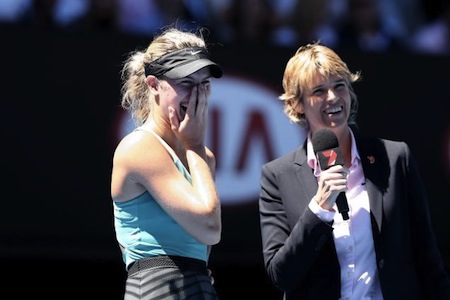A reporter’s dismissal of serious questions is a reminder that many who are looking at Eugenie Bouchard don’t see a winner first—they just see a girl.
Last month, to help us better navigate the holiday socials and family gatherings of the season, Kasey Edwards gave us a list of things to talk to young girls about rather than their appearance. “Despite our best intentions,” Edwards writes, “we have no frame of reference to engage with girls on any level other than the superficial.”
Samantha Smith is one reporter who had a very rich (not to mention personal) frame of reference to draw from when she interviewed Canadian tennis player Eugenie Bouchard about her thrilling win last Tuesday. After her match against 2008 French Open champion Ana Ivonovic, the 19-year-old Bouchard became the first Canadian to reach the semifinals of a grand slam since Carling Bassett-Seguso nearly 30 years ago. Smith, herself the first British woman in 13 years to make the 1994 Wimbledon fourth round, understands the exhilaration of victory all too well. But still, she insisted on asking Bouchard this:
“If you could date anyone in the world of sport, in the world of movies, who would it be?”
When you’re a girl, and you’re in the spotlight—televised or not—the superficiality never stops. At 4, it’s pretty dresses. At 19, it’s dates and boyfriends. Pre-wedding, it’s diets and babies. Post-wedding, it’s more babies. See where I’m going with this?
When you’re a girl, it’s everything but the individual that you are. Even when the context takes all the guesswork out of topic selection (I repeat, this was a professional tennis open), we still find ways to dismiss the autonomy and accomplishments of women.
Gathering what I could from a 30-second clip, Smith seemed uncertain, even embarrassed for Bouchard, prefacing her question with “[Male fans] want to know,” and quickly apologizing with “I’m sorry, they asked me to say this.” The moment wasn’t for live spectators, sports analysts, or proud Canadians. It was for men more interested in the search results for “Eugenie Bouchard + bikini” (the first word that appeared beside her name when I Googled it).
Bouchard, after covering her face with her hand and buying time with a few nervous laughs, answered “Justin Bieber,” and was met with an immediate chorus of boos from the stands.
Why do we clamor for crushes and boyfriends over a female athlete’s achievements or an actor’s body of work? (I’m thinking of Mila Kunis’ March 2013 interview with Allure in which she quipped, “[Talking about] who I’m dating…that’s not talking about myself.”) Psychologist Carol Gilligan, whose book In a Different Voice redefined female moral development in the 1980s, theorizes that male and female perceptions of identity take very different forms. The male image of self is rooted in separation, meaning that men identify themselves according to individual pursuits, projects, and achievements. Women, on the other hand, are more inclined to identify themselves by their relationships with others—mother, daughter, friend, lover, wife.
Of course, Gilligan’s theory leads us to a nice little nature vs. nurture question: Are these “identities” a result of real biological differences or artificial gender constructs? Either way, it comes as no surprise that we are conditioned to ask Rodger Federer for his performance evaluation and Eugenie Bouchard for her crush du jour.
And of course, there’s the historical lag of women behind men in the athletic sphere. Although tennis historically saw female professionals alongside males, it wasn’t until 1973 that women were granted an equal amount of prize money in grand slam opens. Other women’s leagues have gotten a late start in some sports (hockey, basketball) and an exploitative one in others (lingerie football, anyone?).
In an article for the Huffington Post, Myisha Cherry grapples with the frustration of sharing thoughts on a masculine activity (sports) in a masculine space (sports bar) and being taken seriously while doing so. The problem is one of epistemic injustice, she says, a theory that who a speaker is determines how well we receive their message, no matter how valuable that message may be.
[E]pistemic injustice not only happens in bars but in boardrooms and classrooms everyday. When a woman offers an idea up at work she is at times immediately dismissed, but when a man offers the same idea up it is considered brilliant. When a minority offers an intellectual critique in a classroom they are considered arrogant or irrational but when a person in power or of another race says it, people listen up.
The truly unfortunate thing about Bouchard’s interview is that we didn’t have the chance to accept or reject her thoughts on the game of tennis, because she was never asked for them. Samantha Smith’s dismissal of serious questions is laziness at best and the infantilization of women at worst, and it’s a reminder that many who are looking at Eugenie don’t see a winner first—they see a girl.
Chelsea Cristene is a community college professor of English and communications living in central Maryland. She writes Gender on the Rocks, a blog about gender, relationships, culture, education, and the media. Find her on Twitter.
Related Links:

